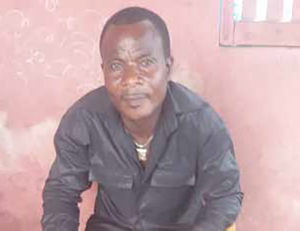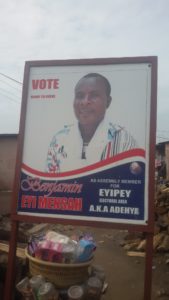How a fisherman had to take the Electoral Commission to court in Ghnana to win a term as assemblyman
In 2014, when Ghana’s Electoral Commission (EC) announced a round of district assembly elections to be held in 2015, Benjamin Eyi-Mensah, a local fisherman and businessman resident in the coastal city of Winneba, decided to contest the election.
Winneba is the capital of Effutu Municipal District in Central Region of South Ghana. Located about 60 kilometres west of Accra, the capital city, it has a population of about 60,000. Centered on an historic fishing community, Winneba formerly served as a port town linking the then-Gold Coast with Europe. Today its main industries are fishing, services and tourism. It is also known for its annual Aboakyer deer-hunting festival in May, and its New Year carnival.

Mr Eyi-Mensah was born into a fishing family in Eyipey, a suburb of Winneba in 1965. The fourth of nine children, he started elementary education in Winneba but had to drop out of school when he was just eight years old due to family financial difficulties. He and his brothers, who were also forced to drop out of school, joined his father in fishing. After their father’s death, Benjamin found himself with the responsibility of managing the family fishing business.
However, their catch dwindled due to a depletion of stock on their coast. For the family, matters were made worse by the entry of many young people into the fishing industry as an alternative to formal employment. Deciding to find other lines of business, Mr Eyi-Mensah bought a sound system, popularly called “dance” or “spinning equipment” in Ghana, to cater for marriages, births, funerals, festivals and naming ceremonies in the city. Later he extended his business activities by providing chairs and canopies for events.
Winneba is home to a number of church denominations and public educational institutions, including the University of Education. Its calendar is dotted with events, including prayer meetings, conventions and matriculation and graduation ceremonies, which brought in more business. Mr Eyi-Mesah’s knack for identifying business opportunities and acting on them made him a popular figure in the city, and he decided to convert this popularity into political capital.
“In Africa, you have to be in an influential position to bring development to your area,” he says. “You need to be able to access the necessary funds for development, and you also need to be able to contact other influential people.”
During the 1990s and early 2000s Mr Eyi-Mensah worked as an organiser for the New Patriotic Party (NPP), a centre-right party, in Winneba. Today he believes that the involvement of young people like himself helped the NPP to win national elections twice, in 2000 and 2004. He loved the work. “When politicians go campaigning that they are able to address real issues…and people are able to engage them in a give-and-take discussion”, he says. “It is in this that I gain my satisfaction.”
A half-brother of Mr Eyi-Mensah’s, Ebenezer Mensah, was the elected assemblyman for, the electoral area he wanted to contest. Ebenezer Mensah had been in office for eight years but Mr Eyi-Mensah felt that “there had not been enough development while he was in office”. There were still no sanitation or health facilities in the area, as well as a lack of educational infrastructure and funding for schooling.
Benjamin Eyi-Mensah’s first move was to contact his relative to tell him that he intended to run for election. Ebenezer had not achieved much in eight years, he told him; he should step down and allow him, Benjamin to represent the people. But Ebenezer turned down the proposal and challenged him to contest the election.
Another, more serious hurdle then appeared. In February 2014, Mr Eyi-Mensah went to the district electoral office to collect his nomination forms, which he filled out and took to the polling station in Eyipey. Only the officers manning such local polling stations had the right to return the forms to the district electoral officer, he had been told.
Over the next two days, Mr Eyi-Mensah returned to the local electoral station several times to submit his forms. Each time local officials told him that the officer responsible for submitting his forms was not available. He had gone out to buy food, he was told, or he was buying airtime. Mr Eyi-Mensah felt that he was being stonewalled. Ebenezer Mensah was affiliated with the ruling National Democratic Congress (NDC), while he himself was a supporter of the opposition, the NPP. He also felt the local officer was sympathetic to the NDC.
On December 22nd 2014, Mr Eyi-Mensah finally got to see the officer, only to be informed that the window to file nominations had closed the previous day, Sunday, December 21st, at 5pm.
Mr Eyi-Mensah contacted the member of parliament for Winneba, Kwamina Afenyo-Markin, a lawyer, who advised him to take the case to court. Mr Eyi-Mensah replied that the MP knew the area because he represented it in parliament, and was also a lawyer, and asked him to handle the case. To his surprise, Mr Afenyo-Markin agreed.

The local elections were scheduled to take place nationwide on March 3rd 2015, but Mr Eyi-Mensah’s case against the EC forced a postponement. “When we heard over the radio and on television that the case had gone to court we all became afraid,” said a friend of Mr Eyi-Mensah’s, Ramford Kwabena Anobil. “How could an individual sue the whole EC? But on second thoughts, after listening to his case, we also felt he was unfairly treated.”
The case went to the Supreme Court, where Mr Afenyo-Markin argued that the EC’s decision to open and close nominations on a single day—of which Mr Eyi-Mensah had not been informed—contravened Articles 45(b) and 51 of Ghana’s 1992 Constitution. Moreover, Mr Afenyo-Markin said, the EC had organised the nationwide local elections in March on the basis of an “immature constitutional instrument”, in that the relevant law had been approved by the judiciary, but had not yet been passed by parliament.
A seven-member panel of the Supreme Court presided over by Justice William Atuguba upheld his argument and declared that the local elections planned for March 3rd were unconstitutional. It also directed the EC to start the nomination process for new local elections afresh, this time empowered by a current law.
The case attracted widespread attention. “Such cases help to develop democracy in Africa,” says lawyer Francis Achibonga, a legal practitioner based in Accra. “The fact that [Mr Eyi-Mensah] had the courage to go to court means that people have built a certain level of trust in Ghana’s legal system.” The postponement of the elections had cost the nation “several millions of cedis”, Mavis Adongo, a resident of Eyipey who was visiting Winneba at the time of the interview, told Africa in Fact. But, she added, it had helped to “settle everybody’s mind that justice can always be sought in Ghana’s courts”.
Ghana’s local government system has its origins in a decentralisation programme introduced in 1987 by then head of state, Jerry Rawlings. In summary, it is made up of a regional coordinating council (RCC), a four-tier metropolitan structure and a three-tier municipal/district assembly structure. Local elections are held every two years; members of district assemblies directly represent their communities. According to a report by German political foundation Friedrich-Ebert-Stiftung, their involvement in local governance has resulted in the effective delivery of services and development projects.
The Supreme Court ordered that fresh elections be held in September 2015, and in July the EC advertised new nominations. Mr Eyi-Mensah picked up some fresh forms, filled them out and duly presented them to the EC. On September 1st 2015, he polled 1,063 votes in Eyipey, beating the incumbent assemblyman, Ebenezer Mensah, who received 503 votes.
Mr Eyi-Mensah plans to focus on two issues during his period of office as an assemblyman: education and sanitation. Nationally, about 96% of children attend primary school, but that drops to 80% at the junior high school level and to about 37% at senior high school level, according to 2012 Unicef study. Less than 37% of pupils who enroll in primary school make it through to tertiary education. In Winneba, according to Mr Anobil, things are even worse. He thinks that just about 20% of school pupils in Winneba end up attending a university, teacher training college, nursing schools or polytechnic.
Mr Eyi-Mensah wants to encourage Eyipey’s parents to support their children’s studies, for one thing. He sees children out on the streets, playing or idling, sometimes until midnight, when they should be indoors, studying or sleeping, he says. And a lack of funds means that even the few who make it through high school are often unable to attend tertiary institutions.
To tackle the problem, he is engaging parents, teachers, and school children in discussions that will enable him to produce a plan to boost education in his electoral area. In the meantime, he has asked parents of children of school-going age to keep them off the streets after 8pm and tasked family heads to enforce the policy.
He has also had talks with other members of his district assembly and contacted the Ghana Education Fund, a public trust in Accra, and other NGOs for help in locating financial support for the building of schools, as well as for school supplies, transport services and scholarships or bursaries for pupils in need.
Secondly, Mr Eyi-Mensah hopes to tackle “the deplorable nature of sanitation” in his area, as he puts it. Eyipey’s fishing activities have contributed to the problem, he says. After treating fish, some people simply scatter the unwanted parts on the beach. Water collected in abandoned fishing boats becomes a breeding ground for mosquitoes. Most people in the community also use the beachfront as a toilet.
There are no bins in the area, so residents simply dump their rubbish on the streets. Drainage systems are inadequate, which sometimes results in flooding or pools of stagnant water, which also pose health risks. To address some of these problems, Mr Eyi-Mensah is working to place waste bins in his area and also encouraging weekly cleaning exercises in the district.
Mr Eyi-Mensah’s term expires in two years, at which time he will face a new round of elections. By that time he hopes to have achieved enough in his two chosen areas of focus to be elected again. He says he hopes there will not have to be another court case.


